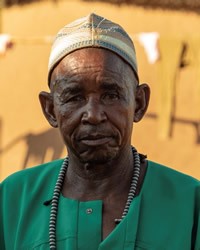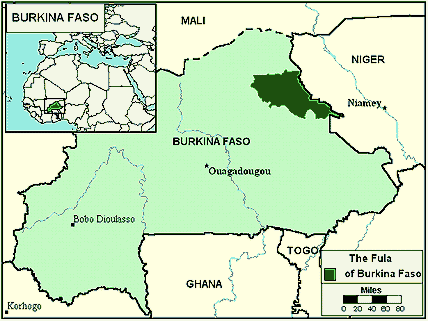The Fulani are comprised of a number of distinct sub-groups who live across a huge swath of central and western Africa, from Senegal in the west and to Sudan in the east. They are bounded in the north by the Sahara Desert and live no further south than Cameroon and the Central African Republic. They are grouped and named according to their location, occupation and dialect of their widely spoken language. Accordingly, there are five major groups of Fulani: the Fula Toro, Fulakunda, Fulfulde, Fuuta Jalon, and Tukolor. Maasina refers to a language, but it can also refer to a Fulani subgroup. Most live in Mali, but a smaller number are in Ghana, Cote d'Ivoire or Burkina Faso. Historically the Fulani were a nomadic people who traveled from one region to another, seeking water for their cattle herds. After migrating from North Africa or the Middle East, they gradually spread eastward (over a 1000-year period from A. D. 900 to 1900), from Senegal and Guinea to as far as Sudan. During their wanderings, they conquered many less powerful tribes. Many Fulani completely or partially abandoned their traditional nomadic life in favor of a sedentary existence in towns or on farms among the conquered peoples.
The Maasina Fulani people live in Burkina Faso, Cote d'Ivoire, Ghana, and Mali.
While some Maasina Fulani maintain the tradition of nomadic wandering, and others remain in one location permanently, the most favored and widespread way of living is semi-nomadic. The hot, tropical climate of north-central and western Africa provides only two seasons, wet and dry. The semi-nomadic Fulani revolve their lives around these seasons, and around a strict division of labor based on gender. During the wet season, the cattle, sheep, and goats remain at a permanent settlement where they are herded by the men and boys, but usually milked and cared for by the women and girls. The men plant, care for and harvest the crops which mostly consist of millet, rice, and peanuts. They also build fences to keep livestock in the appropriate pastures. Meanwhile, the women spend four to five hours each afternoon preparing the evening meal, but only after fetching water, wood, and millet. Besides this arduous task, females must maintain huts, weave mats, spin cotton, make soap, and care for young children. During the dry season, the Fulani practice the nomadic part of their existence. Rather than risking the exhaustion of the village water supply, the young men leave the older men, the women, and the children in the village and take the cattle on a search for alternative water supplies until the rainy season approaches. These nomadic bands camp in portable shelters of poles or branches covered with straw, leaves, or mats. Parents often send children to a village school where they learn to pray and recite parts of the Koran, as the Fulani are almost entirely Muslim. Despite their lack of book knowledge, they are respected social analysts. They place high value on storytelling and proverbs which attempt to teach valuable lessons about life. Christ's disciples can share proverbs and stories from the Bible with them.
The Fulani were one of the first African tribes to convert to Islam and today are overwhelmingly Muslim. Muslims believe that the prophet Mohammed was God's last great prophet. They believe God spoke words to him which were recorded in what is now the Koran. Not only is Islam a religion for the Fulani, but also a way of life. Therefore, any deviation from Islam is condemned and attacked by the entire community. The Fulani have numerous taboos or rules which are never to be broken. A prominent taboo is that of speaking the name of spouses, parents, parents-in-law, first sons, or first daughters.
Maasina Fulani are expected to follow a code of high moral behavior known as Pulaaku. Pulaaku extols virtues such as kindness, bravery, patience, tolerance, perseverance, honesty, diligence, generosity, and dignity. To be reserved is part of being dignified; thus, they are shy and modest in public. A mother does not show affection to her infant son.
Despite many efforts, the overwhelming majority of the Maasina Fulani people remain Muslim, and few turn to Christ fearing the hostility of family and friends. They need prayer!
Pray for the Lord to provide for the Maasina Fulani's livestock so well that they acknowledge his goodness and power.
Pray for the Lord to intervene among the Maasina Fulani in Burkina Faso in such a way that they will become open to accepting the lordship of Christ.
Pray for workers to go to the Maasina Fulani in Burkina Faso.
Pray for a disciple making movement among the Maasina that will spread to other Fulani groups.
Scripture Prayers for the Fulani, Maasina in Burkina Faso.
| Profile Source: Joshua Project |












